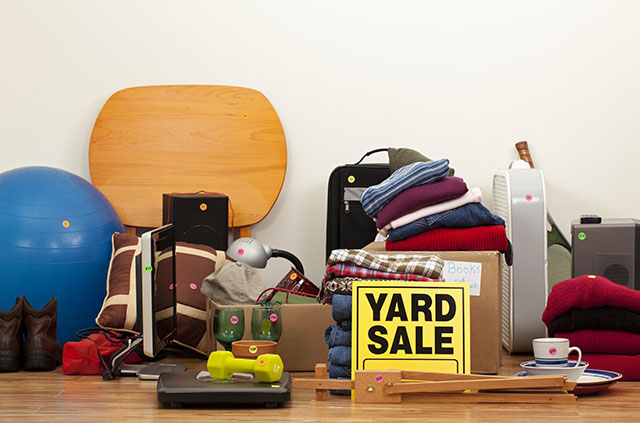
How To Have a Successful Yard Sale: Your Questions, Answered
Home Organization Tips
Should be simple, right? Gather your unwanted goods, put prices on them, set up some tables, and watch the dollars roll in. While you can certainly handle your sale this way, if you want to maximize your profits and minimize frustration, it’s going to take some pre-sale planning. And, lucky for you, we’ve heard some of the most popular questions — and answers — about how to have a successful garage sale. (Note: We’ll be using the terms ‘yard’ and ‘garage’ interchangeably throughout the article, since both locations work well for sales!)
What Is an Estate Sale vs. Garage Sale?
You may see signs in your neighborhood for both estate sales and garage sales. While they both involve selling a home’s contents, they do have their differences. Put simply, estate sales are usually organized by professionals and sell the entire contents of the home. These typically take place because of a significant life change, like moving into a retirement home. Garage sales are smaller, more casual events hosted by homeowners and featuring household items no longer wanted or needed.

“Yard sale season” is usually defined as spring or summer weekend mornings.
What Is the Best Day for Yard Sales?
Everybody’s working for the weekend — because that’s when they’re out and about, trolling for steals and deals. As you likely guessed, Fridays, Saturdays, and Sundays are known as the best time to have a yard sale because that’s when most people can attend. What is yard sale season, though? It’s usually the spring and summer because of favorable weather conditions.
Although, because spring and summer are such popular garage sale seasons, some sources claim that fall is actually the best time to have a garage sale. In short: Just don’t have a garage sale during the cold winter months.
Now that you’ve chosen a day, what about the time? For the best attendance, choose a Saturday or Sunday morning between 7 a.m. and 11 a.m., when temperatures are cooler. If you can have a two-day sale, that’s an even better way to maximize your profits.
Make sure to check the weather forecast, too, before you set your date in stone. Your garage may provide shelter from the storm, but bad weather deters potential customers from coming out of their homes altogether.
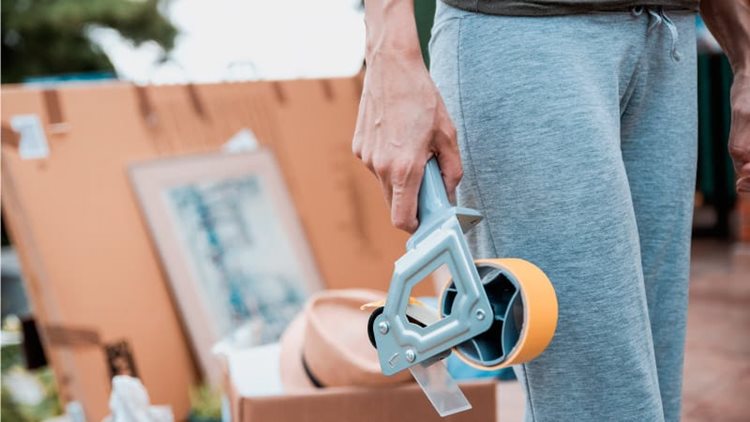
What Supplies Do I Need for a Yard Sale?
Sometimes you’ve got to spend a little money to make a little money. If you don’t already have these basic yard sale supplies on hand, you may want to stock up.Black Permanent Markers
You may not stick to the sale price, but at least it’ll be well seen and won’t rub off. These will also come in handy for signage.
Poster Board
Use posters to advertise your garage sale around your neighborhood and to categorize sale areas (clothing, electronics, kitchenware, etc.).Pricing Stickers
Shoppers are looking for that price tag. Make it easy to find and avoid answering a lot of questions.
Folding Tables
You’ll need some flat surfaces to display your items. Use folding tables or other tables you have on hand.
Cleaning Supplies
Before your sale, make sure your items look their best by giving them a quick once-over.
Shopping Bags
Shoppers may want to buy more than one thing. Make it easy for them by providing some shopping bags. This doesn’t have to be a new purchase; you can reuse some from the grocery store.
Packing Supplies
If you’re selling fragile items, you may want to provide bubble cushioning roll and packing tape to help shoppers get their purchases home safely.
| Pro Tip: If you’re having a garage sale but your garage is already filled with clutter, it might be a good time to do some quick and efficient organizational exercises to clear space for the sale. The PODS Blog has all the information you need to get you started. |

Posters are great for promoting your yard sale, but don’t forget to post the details online, too.
How Do I Attract People to My Yard Sale?
How to have a successful yard sale depends on how well you promote it. Hanging garage sale signs in your neighborhood is great for grabbing people's attention immediately, but some seasoned shoppers peruse social media looking for a good haul.
Post your garage sale details in your neighborhood’s Facebook group, or if a group like that doesn’t exist, make a personal post and share it with your network. Maybe ask a few friends to share the post, too. You can also add a post to Nextdoor and Craigslist. These are great (and free!) alternatives to taking out an ad in your local newspaper.
Did you know that you can also use a garage sale app to spread the word? You can post the details of your garage or yard sale in the garage sale app, so interested parties can attend. Plus, you can sell items directly through the garage sale app. Some even offer donation services for the things that don’t sell.
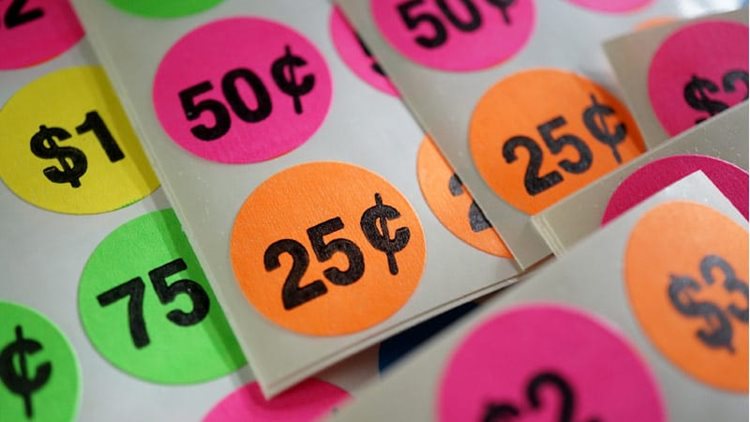
Pricing your items competitively will help them sell faster.
How Should I Price Garage Sale Items?
Here are some quick rules about how to price garage sale items. For additional details, check out another article we’ve written on the PODS Blog about garage sale best practices while moving.
Price Your Things To Sell
People come to garage sales because they want to get a deal. If you have something of real value and want to be paid what it’s worth, consider selling it through another outlet like eBay or Poshmark.Don’t Devalue Your Big-Ticket Items Too Much
While we’re all for competitive pricing, we don’t advocate that you immediately give your stuff away for pennies on the dollar. How do you make the most money at a garage sale? One of the best ways is by prioritizing the sale of your high-quality items, like collectibles, electronics, or furniture. To see what your things are worth, do some research online (again, eBay might be a good place to start) and note the prices of the items in new condition. Then, ask yourself what the condition is of your items (new, like new, used, etc.). Drop the price accordingly for items that have minimal to noticeable wear and tear.
Follow the 10%–20% Rule
Some people suggest pricing your items at only 10 to 20 percent of their retail value if they’re in fair or used condition. It may seem low, but it’ll move your inventory quickly. If your item still has the tag on it or is in excellent shape, you may be able to get away with pricing it for up to 50 percent of the retail price.
Be Prepared To Haggle
Negotiations are part of the garage sale process — they’re half the fun! You’ll likely be asked to lower the price, so consider that when presenting your opening number. How low are you willing to go?
Label Prices Individually
It’s tempting to dump things in an “Everything’s $1” bin, but people may pick up items from different areas and not remember the original location, leaving you to do the guesswork. Doing a little work beforehand to label every item will help you keep things organized on the day of the sale.
| Pro Tip: You can easily become overwhelmed when you start pulling items out of every nook and cranny of your house. For a more relaxed (and spread-out) pre-sale organization, consider taking advantage of the convenience and flexibility of a PODS portable storage container. It’s delivered straight to your driveway, and you can simply load and unload it whenever you’d like. |

What should you not sell at a garage sale? Personal products like used makeup and toiletries.
What Not To Sell at a Garage Sale
You can sell almost anything at a garage sale — emphasis on the word “almost.” Here are some items you’ll want to avoid:- Used undergarments: This isn’t just unsanitary; it’s a turn-off for buyers.
- Used beauty products: Once soaps, makeup, lotions, and other similar toiletries have been opened, it’s best to discard them to prevent the spread of germs.
- Broken appliances and electronics: Unless it’s a simple fix, it’s better to give these away for free or recycle them.
What Is the Average Profit From a Yard Sale?
It’s tough to give a strong estimate of how much money yard sales usually make because some are incredibly successful while others aren’t worth the time and effort. As you can tell from this article, the devil is in the details. With proper planning and garage sale pricing, though, you can potentially earn between $500 and $1,000, depending on how much you have to sell.
What Are The Most — and Least — Popular Garage Sale Items?
Like we mentioned, you can try to sell lots of things at a garage sale, but that doesn’t mean they’ll actually sell. It’s important to keep in mind some things are in higher demand than others.

Selecting in-demand sale items like books, dishes, and tools helps you have a more successful yard sale.
Here Are Some Popular Items:
- Video games and gaming systems: These are expensive to purchase new, so people are looking for deals. Don’t be surprised if potential buyers want to plug them up first to make sure they work before purchasing them, though.
- Outdoor furniture: This type of furniture is going to get some wear and tear no matter what, so it’s easier to sell used.
- Books, especially hardcover ones: These retail for more than $20, so getting books for $5 or less is a deal.
- Sporting equipment: Especially bikes in good condition, skis, and other larger pieces.
- Jewelry: This isn’t the place to sell your grandmother’s wedding ring, but some fun costume jewelry or vintage pieces will likely go quickly.
- Dishes: Again, probably not the place for your expensive china, but if you have some cute everyday dishes or unique pieces, they’re popular for décor hunters.
- Power tools: These are expensive items, so getting quality products (that work!) at a reduced rate has a lot of appeal.
- Toys: If you have toys in good working condition or new in the box, this is a big target for shoppers.
- Children’s clothing: Kids grow quickly. Garage sales are a great way for parents and caregivers to purchase clothing at a discount.
- Purses, handbags, and other accessories: Adult clothing is tough to sell, but accessories are popular because you don’t have to try them on beforehand.
If you’re looking to make some extra-extra money, consider selling food and drinks. All that bargain hunting can make people feel snacky!

Those used coffee mugs were well loved by you, but they may not be as well loved by your buyers.
Here Are Some Items That Typically Don’t Sell As Well:
- Travel souvenirs: They may mean something special to you, but they don’t have the same sentimental value for most shoppers.
- VHS tapes and other outdated electronics: With technology changing at a rapid pace, many electronics are quickly becoming unusable. Don’t put a price on something someone can’t use.
- Used shoes: There’s a certain ick factor to wearing someone’s worn out shoes. Of course, if you have some designer pairs in decent condition, this could be an exception to the rule. Use your best judgment.
- Mugs and cups: Again, it’s a little icky to think about sharing a cup with someone. It’s also tough to sell one-off items that don’t come with a set.
- Armoires and entertainment centers: People typically don’t have big, bulky TVs anymore, making these pieces less sought after.
- Encyclopedias and textbooks: Hello, internet. Goodbye, Britannica.
If you’d like to get rid of items that fall into one of the less desirable categories, consider having a free bin where people can grab things as they please. It’ll at least cut the clutter!
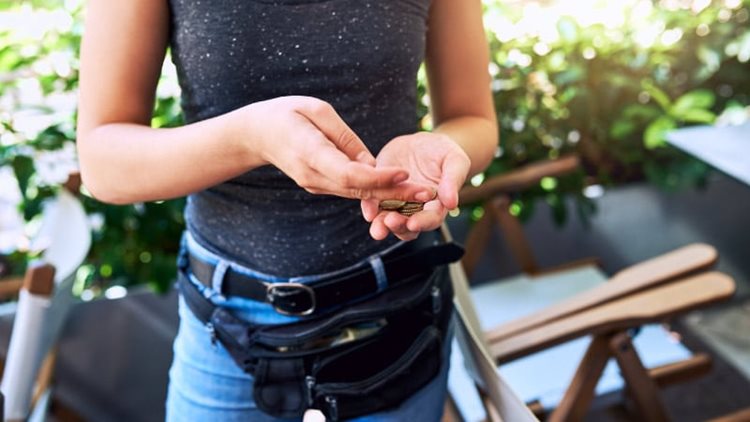
Have around $100 in various bills and coins, so you can make change at your garage sale.
How Much Change Is Needed for a Garage Sale?
We live in a digital world, but cash is still a preferred payment method. While you can use a payment app like Venmo or Square, you’ll still need some change on hand. But how much change to have for a garage sale?
Many experienced sellers recommend having $100 in cash for your garage sale. Not only is this a good amount to get your sale started, but it also makes it easy to calculate your profit quickly. For example, say you’re almost done with your sale and have $800 in your cash box. You can easily deduce that you’ve garnered a $700 profit.
But how much change for a garage sale, specifically? Here’s a suggested breakdown:
- 20 $1 bills
- 5 $5 bills
- 4 $10 bills
- 1 roll of quarters
- 1 roll of dimes
| Pro Tip: Wear a fanny pack and use it to keep your cash. We know it’s not the most fashion-forward suggestion, but it is a safe place to store loose bills and change. It also keeps you from constantly running back and forth for change. |
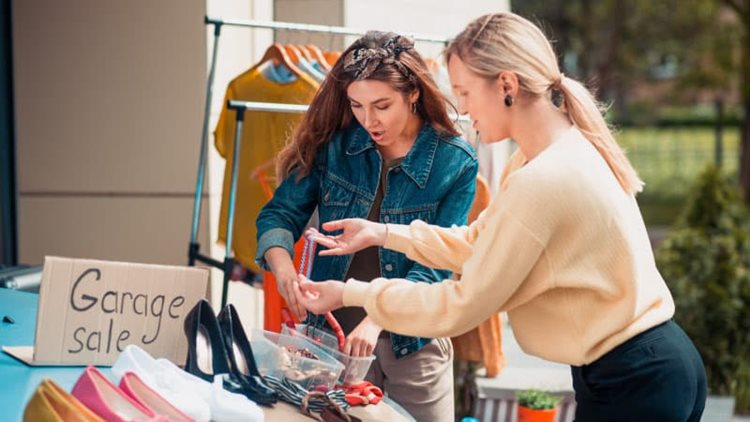
Group similar items together, so garage sale shoppers have an easier time making selections.
How Do I Make My Yard Sale Stand Out?
One of the biggest secrets to how to have a successful garage sale? Make it stand out from the others by carefully organizing and displaying your items. First things first: Get your garage organized, so you can fill it with your sale items. Then, you can move on to arranging your stuff in the most effective garage sale layout.
Put things at eye level instead of laying them on a tarp or blanket. Also, think of your garage sale as a store. Group similar items together, label everything clearly, and think of other ways to make shopping as simple as possible for your customers.
For added temptation, line your bulky furniture and other head-turner items along the driveway. Many potential customers will keep driving if it looks like you don’t have much inventory, so you want to make sure you continue to shift items into plain sight throughout the sale.
| Pro Tip: If your garage sale ends and you still have items you’d like to sell, leave the setup intact in your space and host another garage sale the following weekend. If, at first, you don’t succeed… |
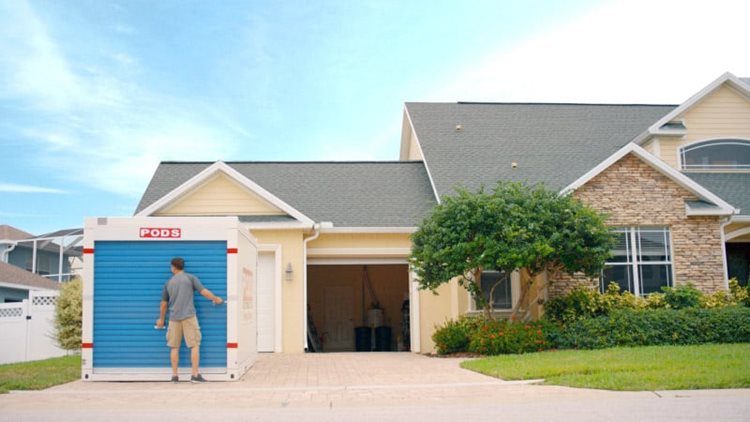
Use a PODS storage container to store items you aren’t ready to sell but don’t need frequently.
What Do I Do After My Garage Sale Ends?
A garage sale is meant to help you declutter your home. With that goal in mind, try to unload as many items as you can during your sale hours, even if that means giving stuff away.
If your sale has ended and you’re still left with some things you no longer want, call a donation service and ask them to cart off anything remaining. It’s never a good idea to bring items back into your home. There’s a reason you wanted to get rid of them in the first place, right?
Finally, if your garage sale has ended and you still have items in your home taking up precious space you don’t necessarily need but don’t want to part with, consider using a PODS storage solution. These convenient portable storage containers can be loaded right in your driveway — at your own pace — and they can either stay at your home for as long as you need them or be securely stored at a local PODS Storage Center with easy access whenever you need it.
Want more decluttering advice? Check out these pro tips for decluttering and downsizing, and get some organizational inspiration from top influencers while you’re at it!
LB Gabriel is a freelance writer who lives with her husband, daughter, and Golden Retriever in Memphis, TN. A frequent PODS Blog contributor, she's a sucker for any tip she can find on downsizing, cutting clutter, or minimalist living. When she's not on a deadline, you can find her on a tennis court or golf course.
Related Articles
Comments
Leave a Comment
Your email address will not be published. Required fields are marked *
